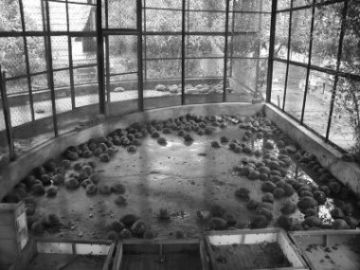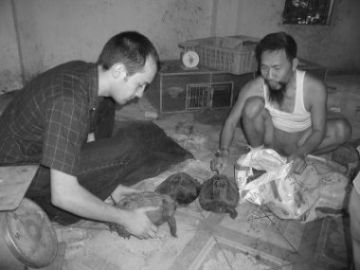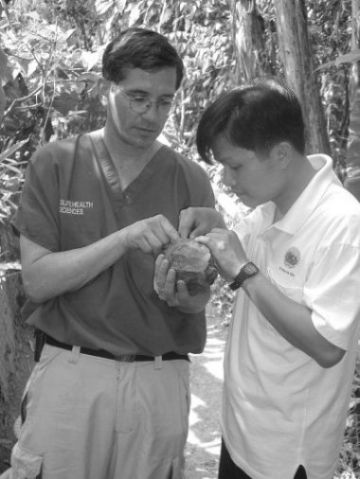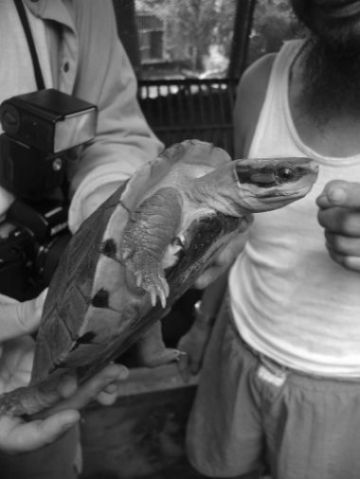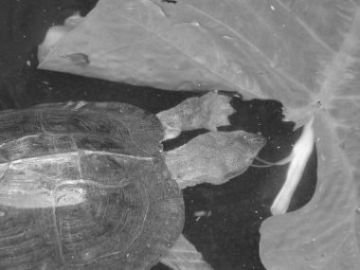Tim McCormack and Douglas Hendrie
Turtle Conservation and Ecology Programme – Indochina
Hanoi Office, A14/25 Lang Ha Street, Hanoi, PO Box 222.
Establishment
The Turtle Conservation and Ecology Project (TCEP) was established in response to the need for immediate and urgent action to protect Vietnam’s tortoises and freshwater turtles threatened by the combined impacts of habitat loss and the wildlife trade.
The concept of developing a conservation programme emerged in 1996 following a major trade seizure in Ninh Binh Province. "Amongst the tons of wildlife in the shipment, there were bags and bags of turtles", says Douglas Hendrie, the programme’s founder. Some of the animals were rescued from the trade, but the turtles were given back and sent onward to China. This incident sparked interest in determining who if anyone was involved in the conservation and protection of Vietnam’s turtles. Not surprisingly to Hendrie, he found a scientific and conservation void in both interest and expertise in turtles.
In 1998, the Turtle Conservation and Ecology Programme was established at Cuc Phuong National Park as part of a larger conservation project managed by Douglas Hendrie, then working for Fauna and Flora International (FFI). The conservation programme focused on seven components aimed at developing a Vietnamese-led effort to conserve and protect their country’s turtles. These include:
- Public awareness and education.
- Training and institutional capacity building of national protection authorities.
- Rescue, rehabilitation, and translocation of turtles back into protected areas and habitat.
- Research on captive ecology and reproduction.
- Field research on the natural distribution and status of Vietnam’s turtles.
- Building interest and expertise in turtles within the national scientific community.
Public awareness and education
One of the principal missions of the TCEP is to raise awareness about the plight of Vietnam’s turtles, and begin the long process of changing public attitudes that will afford greater protection for turtles in the wild. The strategy employed by the TCEP was first focused on getting turtles recognised as a trade species of concern amongst government agencies and institutions, and bringing the turtle crisis into the public eye. This effort involved working with national journalists to report on the crisis in major newspapers, radio, and on TV. Trade seizures, rescue activities and other pertinent progress were routinely provided to journalists through the project newsletter (produced in Vietnamese and circulated to major media organisations), inviting journalists out to Cuc Phuong, and having journalists accompany TCEP on trade surveys and releases of turtles back into the wild.
This programme, combined with TCEP’s efforts to train provincial wildlife protection authorities and work with international and national institutions and organisations, were largely responsible for recognition by government of the turtle crisis, and the elevation of turtles on the list of species of national conservation concern.
TCEP has also worked to raise awareness amongst children and local residents about the need to protect turtles. Working with Cuc Phuong National Park and alongside Education for Nature – Vietnam (ENV), TCEP has produced illustrated stories, a lesson plan for children in school, posters and other resources focused on turtles and their conservation. These materials are used in conjunction with community-based environmental education programmes active at parks and protected areas throughout Vietnam. TCEP’s educational programmes represent a long-term investment in changing public attitudes and developing appreciation for turtles.
Training of wildlife protection authorities
Another important part of TCEP’s conservation strategy involves training of wildlife protection authorities, particularly those at the provincial and local level. A total of eight ranger-training workshops have been carried out at the Turtle Conservation Centre (TCC) since 2000. The workshops focus on providing frontline enforcement officers with a basic understanding of the ecology and threats to Vietnam’s turtles, including introducing the rangers to species native to their particular region or common in the trade, and providing rangers with identification skills that will improve their enforcement capacity. This has already been seen with trade seizures of chelonians, which previously used to be recorded as total shipment weights now being recorded as species.
The TCEP plans to continue with these efforts, utilising the captive population at the TCC for training, in addition to holding workshops in the field for key wildlife protection units at specific target areas.
Rescue, rehabilitation and translocation
The most visible portion of the TCEP’s efforts has been the establishment of the TCC at Cuc Phuong National Park, a 200 square metre facility complete with more than 40 enclosures, four major secure cages, a research laboratory, vet station and quarantine cage. TCEP began to receive shipments of confiscated turtles from provincial ranger units in 1998, and by 2000 the centre had reached capacity with over 750 turtles of 17 species maintained in captivity. While rescuing turtles from the trade has been an obvious component of the TCC, these rescue efforts are not presently sustainable until such time that there is a solution for what to do with turtles once their condition is stabilised at the centre. While placement in long-term conservation-focused programmes and zoos both inside and outside Vietnam is preferable, it is not a viable option at present given the mood of the current National Forest Protection Administration. Secondary options of release or destruction are also not practical, leaving the TCC’s rescue operations limited to a few small seizures since 2000 for which the park was able to accommodate the new turtles.
However, the TCEP has carried out a few planned translocations of turtles since 1998. These include the release of 360 elongated tortoises (Indotestudo elongata) and 48 giant Asian pond turtles (Heosemys grandis) at Cat Tien National Park in the south of Vietnam; the release of the impressed tortoise (Manouria impressa) at Pu Mat National Park; and a series of small releases of keeled box turtles (Pyxidea mouhotii), confiscated locally from hunters, at Cuc Phuong National Park.
Vietnam’s first assurance colony
Working closely with the international Turtle Survival Alliance (TSA), the TCC is serving as a recognised range-state programme and Vietnam’s first established assurance colony for seven species. Five of these are of critical concern, namely the Vietnamese pond turtle (Mauremys annamensis), Indochinese box turtle (Cuora galbinifrons), keeled box turtle (P. mouhotii), four-eyed turtle (Sacalia quadriocellata), and the elongated tortoise (I. elongata). The Asian leaf turtle (Cyclemys pulchristriata) and the stripe-necked leaf turtle (Cyclemis tcheponensis) are also included as part of the assurance colony because of the possible occurrence of these species within Cuc Phuong National Park. Specialised enclosures have been built for four of the focus species including a large pool enclosure, 84m², built in 2001 for the critically endangered and endemic Vietnamese pond turtle (M. annamensis). These specialised enclosures are intended to enhance captive breeding success by providing semi-natural environmentally-enriched habitats for the turtles. Indeed, the M. annamensis conservation programme has yielded an initial 13 hatchlings thus far from 11 founder individuals, with other incidental breeding success reported for the elongated tortoise (I. elongata), keeled box turtle (P. mouhotii), Indochinese box turtle (C. galbinifrons), Asian leaf turtle (C. pulchristriata), Asian box turtle (Cuora amboinensis), and giant Asian pond turtle (H. grandis) – also known as the orange-headed temple turtle.
One of the major difficulties in developing the TCC has been developing the expertise of the TCC staff. Initial training investments were made in two TCEP project co-ordinators. One attended the Asian Turtle Scholarship Programme at the Wetland Institute (USA) in 2000 and the other received specialised training at the Durrell Institute at Jersey Zoo. However, both of these young ecologists went on to work elsewhere not long after returning from their training. Although these investments remain beneficial to the conservation of turtles in Vietnam (one of the ecologists is working in the field and completing his Masters on turtles, and the other is teaching at Vinh University and continues to be involved with TCEP, ranger training and field work), the capacity that would have been inherited by the TCC at Cuc Phuong was lost.
When the FFI-led project at Cuc Phuong was transferred to the park in early 2002 (becoming the TCC, supported but not managed by the TCEP), efforts focused on developing a national park staff candidate who had a long-term contract with the park. In this way, training investments would remain at Cuc Phuong. Mr Bui Dang Phong was assigned by the park to the programme in late 2002. Having graduated from the Forestry College several years before and worked on the community-based education project for two years, Mr. Phong proved to be the right choice, demonstrating the interest, energy and potential to lead the TCC sustainably into the future.
Following the appointment of Mr Phong, TCEP efforts shifted to training him. During March of 2003 the TCC received a visit from Dr Paul Calle, John Behler of the Wildlife Conservation Society (WCS) at the Bronx Zoo in New York and Henk Zwartespoorte of Rotterdam Zoo. The field mission to Vietnam was aimed at providing Mr Phong and the TCC with training and advice that would greatly enhance the park’s efforts to maintain assurance colonies at the park. Specific training involved captive management, husbandry and incubation as well as health screening, treatment and necropsy training for Mr. Phong and the principal keepers. Later in 2003, Mr. Phong will go to the USA where he will receive training at the Bronx Zoo, and veterinarians will return to the TCC for further training.
Captive research projects
In early 2003, TCEP initiated a research programme in co-operation with the TCC. The captive programme involves carrying out a series of basic studies on turtles maintained in captivity at the TCC as part of broader efforts to train TCC staff, provide research opportunities for Vietnamese students, and acquire useful information that could contribute to improving the captive care and management of turtles maintained at the centre. The TCC research programme will also contribute to a better understanding and knowledge of Vietnam’s chelonians. The TCC research programme focuses on the captive ecology, behaviour, and breeding of several turtle species maintained at the centre including the keeled box turtle (P. mouhotii), Indochinese box turtle (C. galbinifrons), Vietnamese box turtle (M. annamensis), and four-eyed turtle (S. quadriocellata) as well as other species where opportunities are presented.
In addition to captive research, TCEP is developing a field research programme that will provide training opportunities for young Vietnamese researchers and useful information on the wild ecology, range, and distribution of specific turtle species in Vietnam. TCEP has already carried out trade surveys of the Vietnamese box turtle (M. annamensis) in the central provinces of Quang Nam, Quang Nhai, and Binh Dinh, and is planning a radio telemetry study of the keeled box turtle (P. mouhotii) at Cuc Phuong National Park.
Outlook 2003
The Turtle Conservation and Ecology Programme serves as a regionally focused conservation programme working with a variety of national and international partners to conserve chelonians in Indochina. Although TCEP was initially based in Cuc Phuong National Park, it has since moved to Hanoi, with the transfer of the Turtle Conservation Centre to the National Park on January 1st 2002. The TCC remains one of many turtle conservation projects and activities for which the TCEP is involved.
The TCEP has undergone a period of rapid development since 1998. While there were many bumps along the road, these efforts have overall exceeded expectations. Efforts in 2003 will build upon the successes of past years, focusing in areas that will provide sustainable inputs to turtle conservation efforts here. While the situation may look grim for turtles in the wild today, there are indications and movement in the right direction that promise better days for turtles tomorrow.
The TCEP remains committed to the conservation of Vietnam’s tortoises and freshwater turtles through building capacity, interest, and expertise amongst its Vietnamese partners to lead this effort into the future. Through its awareness, education and training programmes, TCEP has already made a difference and highlighted the desperate situation for turtles here in Vietnam. It has trained scores of rangers, promoted and developed national expertise in turtles, and established a range-state assurance colony, the TCC, managed by the Vietnamese government.
Tim McCormack can be contacted in his role as Research Advisor by e-mail at: chelonivation{at}yahoo.co.uk
Testudo Volume Five Number Five 2003
Top

